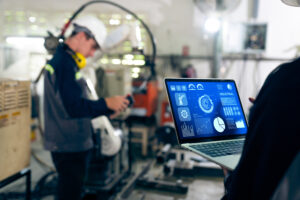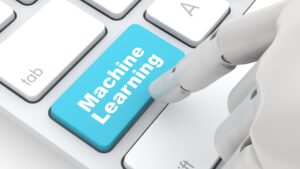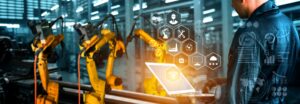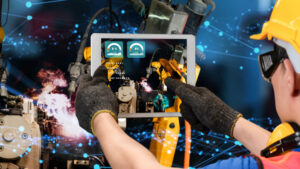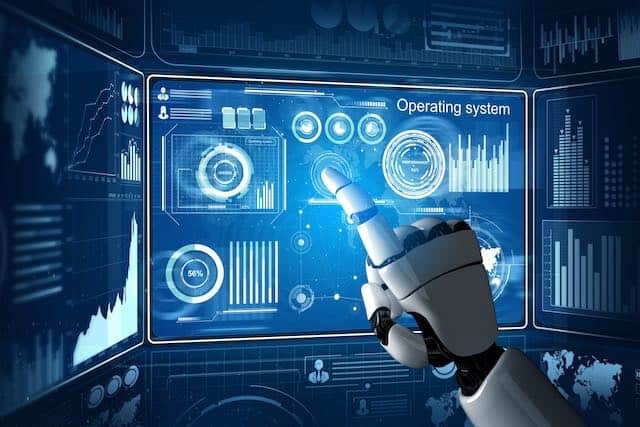
As we approach 2025, the manufacturing sector stands on the brink of a technological revolution. With new challenges and opportunities rapidly emerging, staying informed and adaptable is more crucial than ever.
This blog post delves into the transformative impact of advancements like AI, IoT, and no-code platforms on manufacturing and explores how these technologies are shaping a more efficient and sustainable future.
Conclusion: Preparing for the Future of Manufacturing
The future of manufacturing is undeniably tied to technological advancement. Embracing technological advancements, such as automation, IoT, AI, codeless platforms will be crucial for manufacturers looking to enhance efficiency and competitiveness. Moreover, adopting sustainable practices will not only address environmental concerns but also meet the expectations of increasingly conscious consumers.
To thrive in this evolving industry, manufacturers must prioritize continuous learning and adaptability. Staying informed about emerging trends and technologies will enable organizations to identify opportunities and mitigate challenges. Investing in employee training and development will also be key to equipping the workforce with the skills needed to navigate the future of manufacturing.
Finally, collaboration across the supply chain will be essential for driving innovation and achieving sustainability goals. By working together, manufacturers, suppliers, and customers can create a more resilient and responsive manufacturing ecosystem. As we look toward 2025 and beyond, the future of manufacturing promises to be dynamic, and those who are prepared will be well-positioned to lead the way.
Advancements in technology shaping the future of manufacturing
The manufacturing landscape is undergoing a dramatic transformation, fueled by rapid advancements in technology. The integration of cutting-edge tools and systems is redefining traditional production processes, enabling organizations to enhance efficiency and deliver high-quality products. With the emergence of smart factories, manufacturers are increasingly relying on interconnected devices and systems to streamline operations. This interconnectedness allows for real-time monitoring and management, leading to improved decision-making and productivity.
The landscape of manufacturing is being reshaped by several key technological advancements. These innovations are not just enhancements; they are the pillars upon which the future of manufacturing will be built:
- Automation and Robotics: These technologies reduce human error, increase production speed, and handle tasks that are dangerous for humans, thus improving safety and efficiency.
- Internet of Things (IoT): IoT devices collect and analyze data in real-time, enabling predictive maintenance, and improved supply chain management.
- Artificial Intelligence (AI): AI’s ability to learn and adapt is being used to optimize manufacturing processes, from design to delivery.
- 3D Printing: This technology is revolutionizing manufacturing with its ability to create complex parts quickly and at a lower cost.
- Sustainable Practices: As global awareness and regulations around environmental impact increase, technologies that help reduce waste and energy consumption are becoming essential.
- Data Analytics: The backbone of modern manufacturing, data analytics, allows for smarter decisions based on actionable insights from real-time data.
Future trends and predictions in the manufacturing industry
The future of manufacturing holds exciting possibilities as emerging trends and technologies reshape the industry landscape. One prominent trend is the continued rise of smart factories, characterized by interconnected systems, real-time data analytics, and automation. As manufacturers adopt Industry 4.0 principles, they will increasingly leverage advanced technologies to create agile and responsive production environments. This shift will enable companies to adapt quickly to changing market demands and enhance their competitiveness.
Another significant trend is the growing importance of sustainability in manufacturing. As consumers become more environmentally conscious, manufacturers will need to prioritize eco-friendly practices to meet demand. This includes adopting circular economy principles, reducing waste, and investing in renewable energy sources. Companies that embrace sustainability will not only enhance their brand reputation but also position themselves for long-term success in a market that increasingly values environmental responsibility.
Additionally, the integration of artificial intelligence and machine learning will play a pivotal role in the future of manufacturing. As these technologies continue to evolve, manufacturers will harness their capabilities to enhance decision-making, improve production efficiency, and drive innovation. The ability to analyze vast amounts of data in real-time will empower manufacturers to make informed choices that optimize their operations and respond to market changes.
As we look ahead, the manufacturing industry will undoubtedly undergo significant transformations driven by these and other emerging trends:
- Increased Adoption of AI and IoT: These technologies will become more pervasive, driving efficiencies and new capabilities in predictive analytics and automated decision-making.
- Growth of Sustainable Manufacturing: Eco-friendly practices will move from being competitive advantages to industry standards.
- Expansion of 3D Printing: As materials and processes improve, 3D printing will play a pivotal role in production, especially in custom and on-demand manufacturing.
- Enhanced Data Security: With the increase in data integration, robust cybersecurity measures will be crucial to protect sensitive information.
The Role of No-Code Platforms in Manufacturing
No-code platforms like NC-Vision’s True No-Code Platform are revolutionizing how manufacturers integrate and benefit from these technologies. Here’s how:
- Ease of Use: No-code platforms empower non-technical staff to build applications, reducing dependency on IT experts and accelerating digital transformation.
- Customization and Flexibility: Easily adaptable to specific needs without extensive coding, supporting a more agile manufacturing process.
- Cost Efficiency: Reducing the need for expensive software development and lengthy deployment times cuts down overall technology costs.
- Integration Capabilities: Seamless integration with existing systems and new technologies alike, enhancing data flow and system interoperability.
Recommended Reads
To further explore these topics, consider diving into the following resources:
1. “2025 Manufacturing Industry Outlook” by Deloitte provides valuable insights into the future trends and challenges facing the manufacturing industry. This comprehensive report offers strategic recommendations for manufacturers looking to navigate the evolving landscape and capitalize on emerging opportunities. Read more>>
2. “Top Technology Trends for 2025” by Gartner explores the key technological advancements that will shape industries, including manufacturing, in the coming years. This report delves into the impact of AI, IoT, and other innovations on business operations and offers predictions for the future of technology adoption. Read more>>
3. “The 5 Biggest Business Trends For 2025 Everyone Must Be Ready For Now” by Forbes provides a holistic view of the macroeconomic and industry-specific trends that will influence business strategies in the near future. This article covers topics like sustainability, digital transformation, and the changing workforce dynamics, offering valuable insights for manufacturing leaders looking to stay ahead of the curve. Read more>>



Made for production, manufacturing, and beyond:
By embracing no-code platforms, manufacturers can swiftly adapt to changes, implement new technologies, and remain competitive in a dynamic global market. Explore the possibilities with a platform that breaks down complex technological barriers and opens up a world of innovation. platform? Schedule a Free Platform Tour today to explore how NC-Vision can help you achieve your goals and unlock the full potential of your business.
NC-Vision is committed to helping the manufacturing industry make the most of no-code software development. We offer a range of no-code solutions that enable companies to quickly and easily create custom solutions that are tailored to their needs. Our tools allow companies to create solutions faster, more cost-effectively, and with more customization than ever before.









